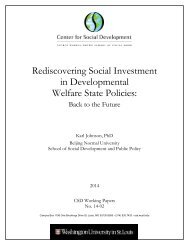Exploring and Assessing Intercultural Competence - Center for ...
Exploring and Assessing Intercultural Competence - Center for ...
Exploring and Assessing Intercultural Competence - Center for ...
Create successful ePaper yourself
Turn your PDF publications into a flip-book with our unique Google optimized e-Paper software.
<strong>Exploring</strong> <strong>and</strong> <strong>Assessing</strong> <strong>Intercultural</strong> <strong>Competence</strong><br />
Proficiency Scale (developed by the American Council on the Teaching of Foreign Language) is<br />
employed to help ascertain how language correlates with <strong>and</strong> affects ICC development.<br />
The perspectives just cited directly influence our approach to assessment. It is clear that of the<br />
various intercultural assessment tools collected <strong>and</strong> examined, none is based on as broad a<br />
conceptualization as presented here. Each tool reflects a slightly differing (<strong>and</strong> usually more<br />
limited) concept, some stressing global knowledge, sensitivity, or skills, with differing purposes<br />
in mind, <strong>and</strong> <strong>for</strong> use with varied populations. The original Assessment of <strong>Intercultural</strong><br />
<strong>Competence</strong> (AIC) instrument (on which the survey questionnaire was based) reflects all of the<br />
components mentioned in the concept above. Moreover, this exp<strong>and</strong>ed concept had already been<br />
widely disseminated <strong>and</strong> widely accepted at national <strong>and</strong> international conferences including<br />
NAFTA in 2001, where our invited paper was adopted by hundreds of participating universities,<br />
<strong>and</strong> at another conference sponsored by the Stanley Foundation in 2002 <strong>for</strong> community colleges<br />
nationwide, where it was again adopted <strong>and</strong> <strong>for</strong>med part of the conference report (cf. Appendix I:<br />
ICC Bibliography).<br />
The fields of service, cross-cultural education, intercultural communication, assessment<br />
(especially, “outcomes assessment”), <strong>and</strong> research (utilizing varied modes) have produced much<br />
relevant in<strong>for</strong>mation over the past 25 years (cf. Appendix I: ICC Bibliography). A Canadian<br />
study by Daniel Kealey, <strong>for</strong> example, was especially helpful despite a narrow focus on the<br />
per<strong>for</strong>mance <strong>and</strong> effects on Canadian technical advisors in intercultural situations. Many other<br />
researchers have also investigated study abroad programs <strong>and</strong> a few have addressed service<br />
projects, the area most closely related to this project. While useful insights were drawn from these<br />
<strong>and</strong> other studies, the current project remains distinctive because of its broad <strong>and</strong> inclusive<br />
characterization of intercultural competence.<br />
Finally, most research on intercultural outcomes to date has been conducted in English, about<br />
North Americans, <strong>and</strong> reflects a distinctly North American perspective. In contrast, this project<br />
looks at multiple nationalities, using multiple languages, <strong>and</strong> employs both quantitative <strong>and</strong><br />
qualitative data.<br />
To summarize, the assumptions <strong>and</strong> frameworks guiding this project in its design <strong>and</strong><br />
implementation were:<br />
- the Federation EIL’s vision <strong>and</strong> mission,<br />
- a broad construct of the components of intercultural communicative competence,<br />
based on the literature review <strong>and</strong> our own experience,<br />
- <strong>and</strong> an assumption that FEIL staff share a desire to improve the quality of their<br />
programs <strong>and</strong> to enhance the positive impact of programs on participants.<br />
And the project plan incorporates:<br />
- quantitative <strong>and</strong> qualitative research data<br />
- research assistants contracted locally in the three MOs involved, competent to translate<br />
<strong>and</strong> implement the plan in local languages: German, British English, Spanish<br />
- research assistants able to compile <strong>and</strong> summarize data in country reports<br />
- a local research assistant in Vermont to assist in data tabulation<br />
- <strong>and</strong> finally, compilations of individual MO findings collected into a final composite<br />
reports that permit analysis by sub-groups <strong>and</strong> globally as well.<br />
3. Project Design<br />
<strong>Center</strong> <strong>for</strong> Social Development<br />
Washington University in St. Louis<br />
10
















